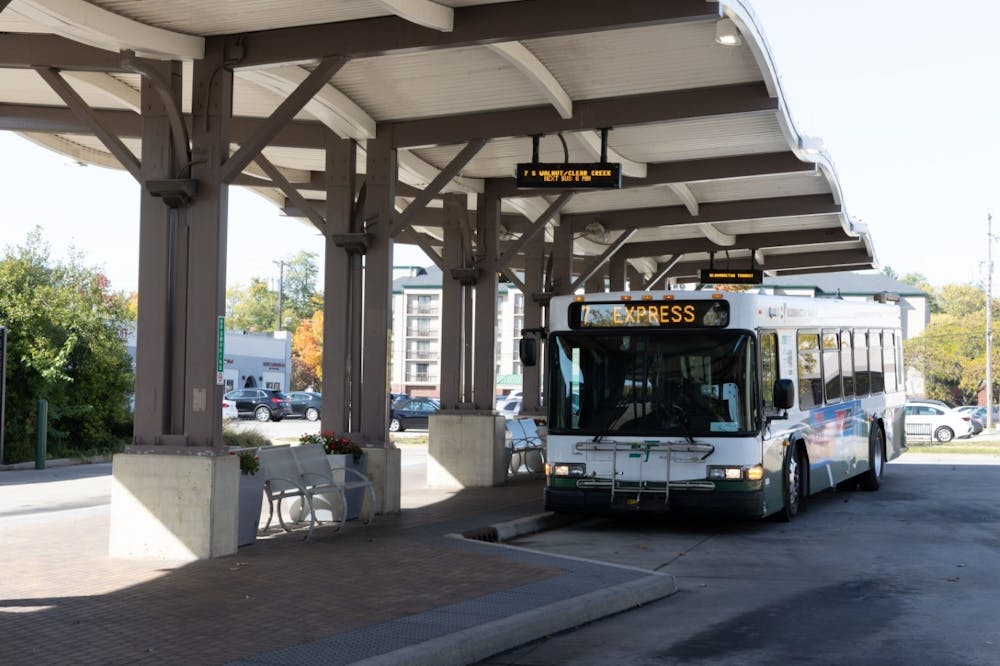The Greater Bloomington Chamber of Commerce hopes the board of Bloomington Transit will vote to expand Route 3 by 1.3 miles in the west direction to serve those in Park 48 and Ivy Tech facilities, according to a Herald-Times guest column. In his column, Eric Spoonmore, the president and CEO of Greater Bloomington Chamber of Commerce, said City Council also supported this idea when they passed Resolution 22-16, a document sponsored by Councilmember Steven Volan.
Spoonmore said the resolution favored extending the transit services outside city boundaries, something the municipal code didn’t allow previously. While the resolution signifies council members want to expand transit lines, it doesn’t formally approve an infrastructural change or construction. Spoonmore said the expansion has been an ongoing conversation in both the business and residential community and by extending services, the city will be able to serve those accordingly.
Park 48 is an industrial group of businesses located off State Road 48. It features businesses such as Cook, Baxter Pharmaceutical Solutions and BioConvergence LLC.
Route 3 was the most logical choice because of the Park 48 and Ivy Tech proximity, Spoonmore said. He said the Route 3 extension could be implemented relatively quickly and hopefully by the spring semester.
Related: [MCCSC administrators discuss transportation goal at school board meeting Tuesday]
Spoonmore said this project could improve conditions before the city is able to implement a longer-term project in response to Mayor Hamilton’s Local Income Tax proposal – one that increases taxes for four purposes including climate change mitigation. A big part of that was increasing transit services, he said. Spoonmore said he didn’t believe extending Route 3 was explicitly mentioned. Rather the Local Income Tax proposal spoke about a new East-to-West Express Route. Since it didn’t extend to the unincorporated areas that target a lot of business communities, the Route 3 idea came up.
He said the new route project seems like a two-year process and $2 million in funding. The chamber is therefore advocating this temporary extension of Route 3 to still serve those who can benefit from such a service. Spoonmore said this project will cost $100,000 more annually and he believes it is much more manageable for the county government.
He said enhancing transit services provides workers with more accessible and affordable options to get to where they need to go.
“I think this will be a really good opportunity for people to have access to these resources in their community,” Whitney Koelling, a public policy specialist at the Greater Bloomington Chamber of Commerce, said. “You don’t need to have a car to get an education. You can get on the bus and go.”
Jennifer Vaughan, the chancellor of Ivy Tech Community College, said Ivy Tech currently doesn’t have a system of public transportation, but that the need is significant.
She said Ivy Tech works with IU-Bloomington in the Hoosier Link program – a program that gives Ivy Tech students housing accommodations at IU-Bloomington. Vaughan said the program has 70 students enrolled and the transit option could make things easier for students without cars on campus.
Related: [Bloomington enacts curfew for e-scooter usage, releases new guidelines]
The closest stop is about a mile away from campus and it’s very far, especially in times of bad weather, Vaughan said.
“I just see it growing and really helping students choose the right place and format for them to take classes,” Vaughan said.
Zac Huneck, the planning and special projects manager at Bloomington Transit, said Bloomington Transit works to promote mobility and the ability for people to reach opportunities.
He said BT knew for years that the transit extension was in a prime location because of a route optimization study they did in 2019-20. At the time it was a combination of available resources and being statutorily bound to areas within the city, he said.
Huneck said Bloomington Transit recognizes the benefits of increasing people’s freedom of movement, but that there’s a tradeoff between improving the quality of service and expanding coverage. Currently, Bloomington Transit has a limited number of drivers, and they want to be able to balance coverage and ridership goals.
Historically speaking, Bloomington Transit hasn’t provided service to those outside of the city, so there is the issue of folks paying for services and not necessarily using the service, he said.
Huneck said Bloomington Transit is in a conceptual phase now and is pending decision-making. He said by increasing local income taxes, Bloomington Transit became a big beneficiary and was able to increase its next year’s budget by 40-50%. Huneck said he’s excited to explore options and make changes that help cater to businesses and students.




